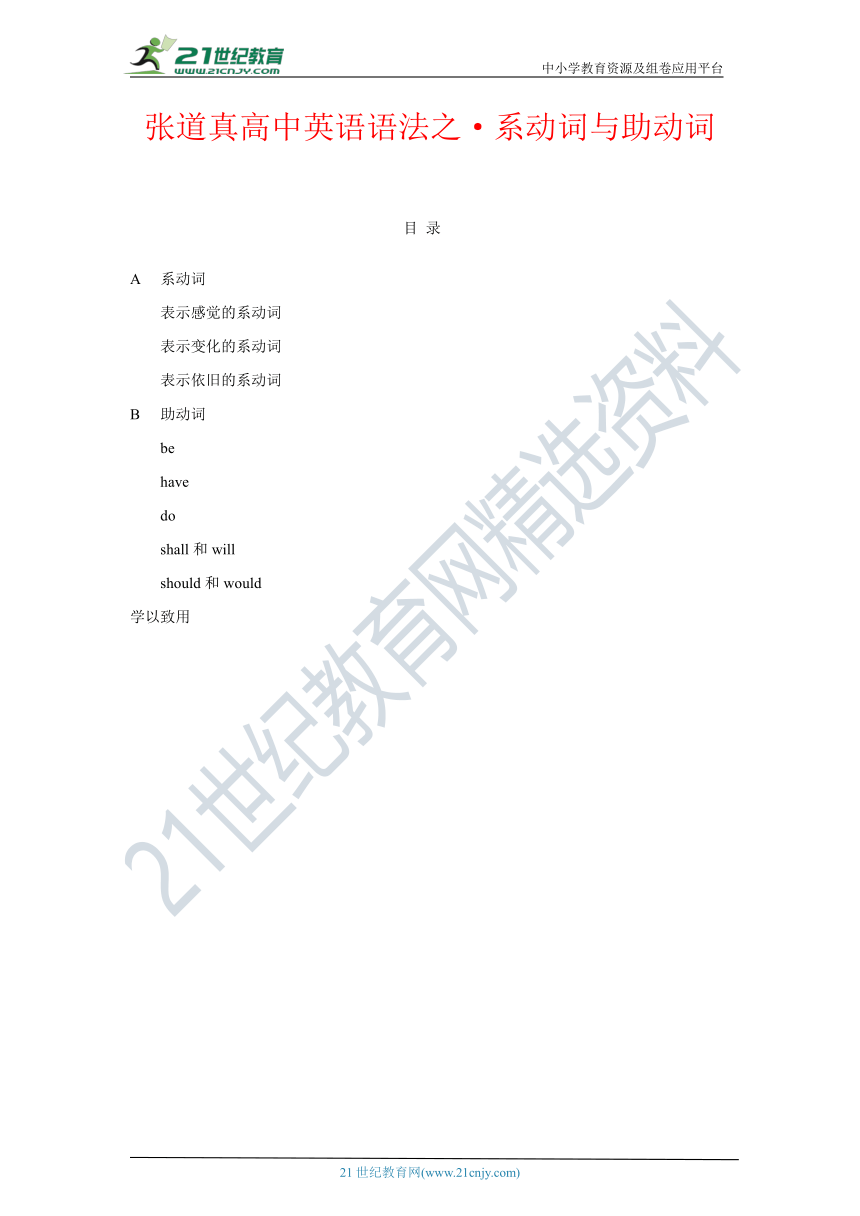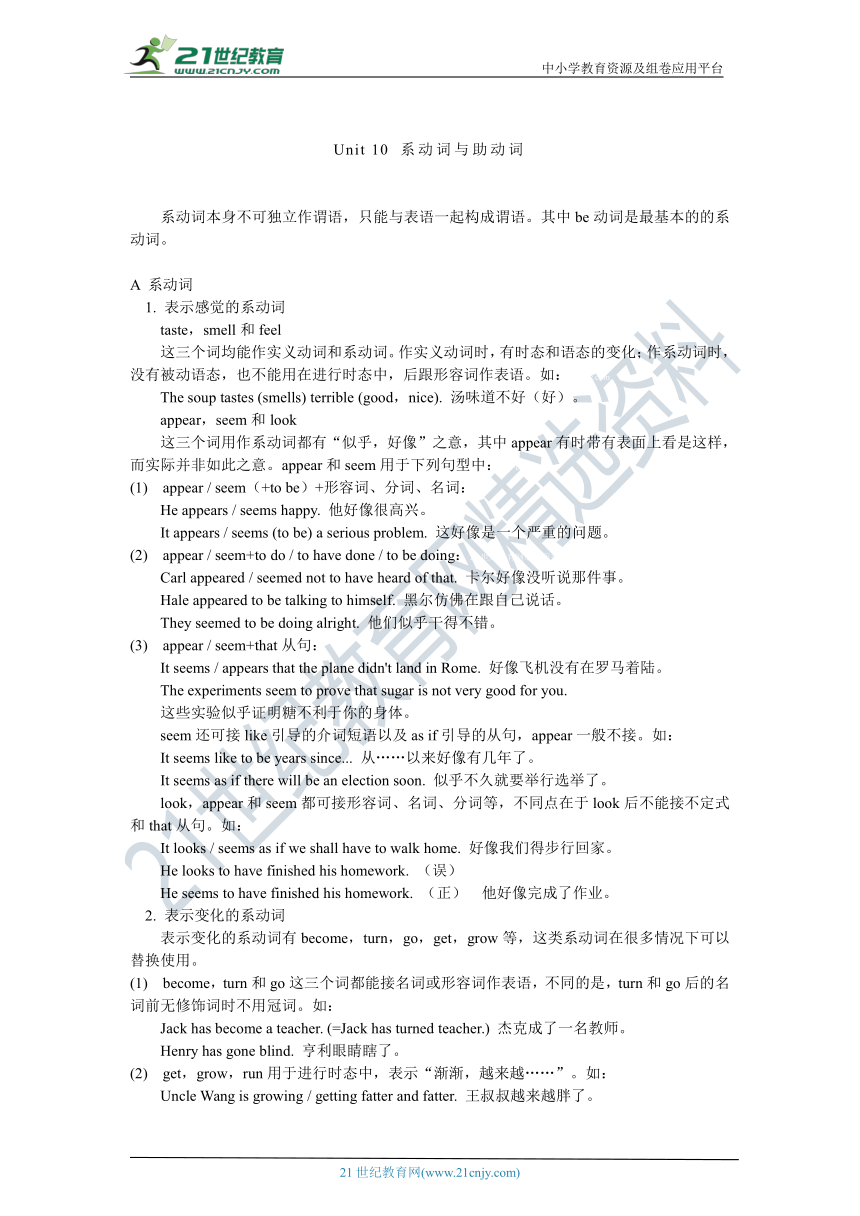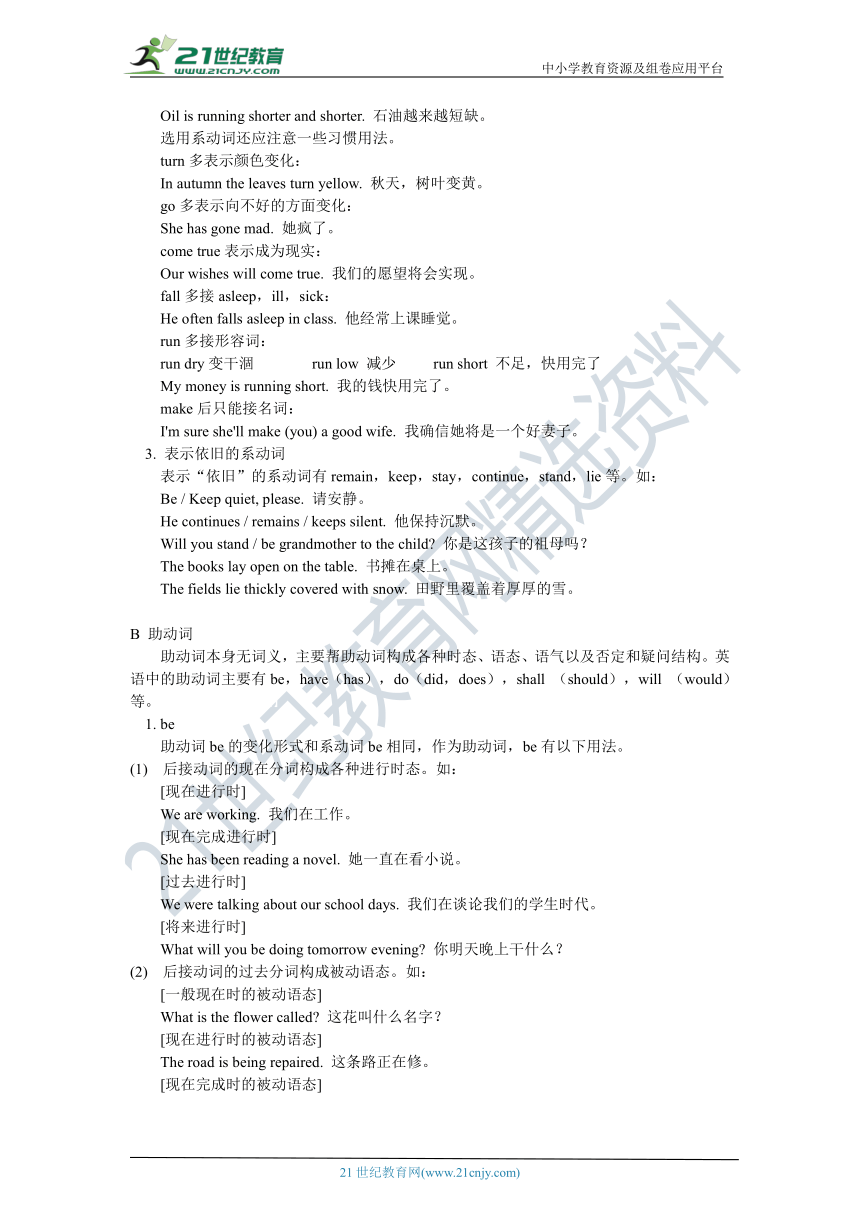高中英语语法之10系动词与助动词
图片预览



文档简介
中小学教育资源及组卷应用平台
张道真高中英语语法之·系动词与助动词
目 录
A 系动词
????表示感觉的系动词
????表示变化的系动词
????表示依旧的系动词
B 助动词
????be
????have
????do
????shall和will
????should和would
学以致用
Unit 10 系动词与助动词
系动词本身不可独立作谓语,只能与表语一起构成谓语。其中be动词是最基本的的系动词。
A 系动词
1. 表示感觉的系动词
taste,smell和feel
这三个词均能作实义动词和_?????¨è???????????_义动词时,有时态和语态的变化;作系动词时,没有被动语态,也不能用在进行时态中,后跟形容词作表语。如:21cnjy.com
The soup tastes (smells) terrible (good,nice). 汤味道不好(好)。
appear,seem和look
这三个词用作系_??¨è??é???????????_乎,好像”之意,其中appear有时带有表面上看是这样,而实际并非如此之意。appear和seem用于下列句型中:2·1·c·n·j·y
(1) appear / seem(+to be)+形容词、分词、名词:
He appears / seems happy. 他好像很高兴。
It appears / seems (to be) a serious problem. 这好像是一个严重的问题。
(2) appear / seem+to do / to have done / to be doing:21世纪教育网版权所有
Carl appeared / seemed not to have heard of that. 卡尔好像没听说那件事。
Hale appeared to be talking to himself. 黑尔仿佛在跟自己说话。21·世纪*教育网
They seemed to be doing alright. 他们似乎干得不错。
(3) appear / seem+that从句:
It seems / appears that the plane didn't land in Rome. 好像飞机没有在罗马着陆。
The experiments seem to prove that sugar is not very good for you. 21*cnjy*com
这些实验似乎证明糖不利于你的身体。
seem还可接like引导的介词短语以及as if引导的从句,appear一般不接。如:
It seems like to be years since... 从……以来好像有几年了。
It seems as if there will be an election soon. 似乎不久就要举行选举了。
look,appear和seem都可接形容词、名词、分词等,不同点在于look后不能接不定式和that从句。如:
It looks / seems as if we shall have to walk home. 好像我们得步行回家。
He looks to have finished his homework. (误)
He seems to have finished his homework. (正) 他好像完成了作业。
2. 表示变化的系动词
表示变化的系动词有become,turn,go,get,grow等,这类系动词在很多情况下可以替换使用。
(1) become,turn和go这三个词都能接名词或形容词作表语,不同的是,turn和go后的名词前无修饰词时不用冠词。如:
Jack has become a teacher. (=Jack has turned teacher.) 杰克成了一名教师。
Henry has gone blind. 亨利眼睛瞎了。
(2) get,grow,run用于进行时态中,表示“渐渐,越来越……”。如:
Uncle Wang is growing / getting fatter and fatter. 王叔叔越来越胖了。
Oil is running shorter and shorter. 石油越来越短缺。
选用系动词还应注意一些习惯用法。
turn多表示颜色变化:
In autumn the leaves turn yellow. 秋天,树叶变黄。
go多表示向不好的方面变化:
She has gone mad. 她疯了。
come true表示成为现实:
Our wishes will come true. 我们的愿望将会实现。
fall多接asleep,ill,sick:
He often falls asleep in class. 他经常上课睡觉。
run多接形容词:
run dry变干涸 run low 减少 run short 不足,快用完了
My money is running short. 我的钱快用完了。
make后只能接名词:
I'm sure she'll make (you) a good wife. 我确信她将是一个好妻子。
3. 表示依旧的系动词
表示“依旧”的系动词有remain,keep,stay,continue,stand,lie等。如:
Be / Keep quiet, please. 请安静。
He continues / remains / keeps silent. 他保持沉默。
Will you stand / be grandmother to the child? 你是这孩子的祖母吗?
The books lay open on the table. 书摊在桌上。
The fields lie thickly covered with snow. 田野里覆盖着厚厚的雪。
B 助动词
助动词本身无_è???????????è?????_助动词构成各种时态、语态、语气以及否定和疑问结构。英语中的助动词主要有be,have(has),do(did,does),shall (should),will (would)等。【来源:21·世纪·教育·网】
1. be
助动词be的变化形式和系动词be相同,作为助动词,be有以下用法。
(1) 后接动词的现在分词构成各种进行时态。如:
[现在进行时]
We are working. 我们在工作。
[现在完成进行时]
She has been reading a novel. 她一直在看小说。
[过去进行时]
We were talking about our school days. 我们在谈论我们的学生时代。
[将来进行时]
What will you be doing tomorrow evening? 你明天晚上干什么?2-1-c-n-j-y
(2) 后接动词的过去分词构成被动语态。如:
[一般现在时的被动语态]
What is the flower called? 这花叫什么名字?
[现在进行时的被动语态]
The road is being repaired. 这条路正在修。
[现在完成时的被动语态]
They have been given a warning. 他们受到警告。
[一般过去时的被动语态]
She was asked to stay. 她被要求留下。
(3) 后接动词不定式
表示未来的计划或安排。如:
Where are we to meet? 我们将在哪儿见面?
They're to leave for Shanghai tomorrow. 他们定于明日到达上海。
表示必要或命令。如:
You are to hand in your exercise this afternoon. 你们必须今天下午把练习交来。
Am I to go on with the work? 这工作我要继续做下去吗?
表示可能。如:
Such books are to be found in any library. 这种书在哪个图书馆都能找到。
Not a sound was to be heard. 一点声音也听不到。
(4) 与具有动作特征的形容词构成祈使句。如:
Be quick! 快点!
(5) 用于虚拟语气。如:
If I were at school again, I would study harder. 如果我再次上学,我会更加努力学习。
2. have
have有has,have,had三种形式,主要用法如下:
(1) 后接过去分词,构成完成时态:表示一段时间内已经完成的动作或存在的情况。如:
[现在完成时]
Jones has had a car accident, and he is now unable to do his work. 21·cn·jy·com
琼斯出了车祸,他现在无法办公。
[过去完成时]
We had never met before. 我们以前从未见过面。
[将来完成时]
They will have got there by ten o'clock. 他们10点前已经到达那儿。
(2) 后接现在分词,构成完成进行时态:表示一段时间内一直进行的动作。如:
[现在完成进行时]
She has been teaching there for twelve years. 她在那里教了12年书。
[过去完成进行时]
Bruce said he had been waiting for a reply. 布鲁斯说他一直在等候回信。
(3) 用于虚拟语气。如:
If you had come earlier, you would catch the bus. 如果你早点来,就能赶上公共汽车。
Alan wished he had seen the film. 艾伦希望他看过这部电影。
3. do
(1) 助动词do用来构成疑问句、否定句以及祈使句。如:
[特殊疑问句]
How do you like the weather in Beijing? 你觉得北京的天气怎么样?
[否定句]
We do not often go there. 我们不常去那里。
[反意疑问句]
She speaks good English, doesn't she? 她英语讲得很好,对吗?【来源:21cnj*y.co*m】
[祈使句]
Do be quiet! 安静点!
(2) 用于替代和强调。如:
I don't like s_ports__and neither does my brother. (does=My brother doesn't like sports.)
我不喜欢体育运动,我弟弟也不喜欢。
—Your father promised you a bike. 你父亲答应给你买一辆自行车。
—So he did. (did=He promised me a bike.) 他是答应过。
I do think you are right. 我的确认为你是对的。
4. shall和will
助动词shall和will_???è????????è?????_,在一般将来时中,shall和will之后都接动词原形。shall用于第一人称的将来时态;will用于第二、三人称的将来时态,第一人称也可用will。如:www.21-cn-jy.com
I shall think it over. 我要好好考虑一下。
He will be sixteen years old next month. 他下个月将是16岁。【版权所有:21教育】
You will have an English examination tomorrow. 你们明天有英语考试。
5. should和would
(1) should无词义,是shall的过去式,与动词原形构成过去将来时,只用于第一人称。如:
I telephoned him yesterday to ask what I should do next week. 【出处:21教育名师】
我昨天给他打电话,问他下周我干什么?
(2) would无词义,是will的过去式,与动词原形构成过去将来时,用于第二、三人称。如:
Jim said he would come. 吉姆说他要来。
_21?????????è?????(www.21cnjy.com)_
张道真高中英语语法之·系动词与助动词
目 录
A 系动词
????表示感觉的系动词
????表示变化的系动词
????表示依旧的系动词
B 助动词
????be
????have
????do
????shall和will
????should和would
学以致用
Unit 10 系动词与助动词
系动词本身不可独立作谓语,只能与表语一起构成谓语。其中be动词是最基本的的系动词。
A 系动词
1. 表示感觉的系动词
taste,smell和feel
这三个词均能作实义动词和_?????¨è???????????_义动词时,有时态和语态的变化;作系动词时,没有被动语态,也不能用在进行时态中,后跟形容词作表语。如:21cnjy.com
The soup tastes (smells) terrible (good,nice). 汤味道不好(好)。
appear,seem和look
这三个词用作系_??¨è??é???????????_乎,好像”之意,其中appear有时带有表面上看是这样,而实际并非如此之意。appear和seem用于下列句型中:2·1·c·n·j·y
(1) appear / seem(+to be)+形容词、分词、名词:
He appears / seems happy. 他好像很高兴。
It appears / seems (to be) a serious problem. 这好像是一个严重的问题。
(2) appear / seem+to do / to have done / to be doing:21世纪教育网版权所有
Carl appeared / seemed not to have heard of that. 卡尔好像没听说那件事。
Hale appeared to be talking to himself. 黑尔仿佛在跟自己说话。21·世纪*教育网
They seemed to be doing alright. 他们似乎干得不错。
(3) appear / seem+that从句:
It seems / appears that the plane didn't land in Rome. 好像飞机没有在罗马着陆。
The experiments seem to prove that sugar is not very good for you. 21*cnjy*com
这些实验似乎证明糖不利于你的身体。
seem还可接like引导的介词短语以及as if引导的从句,appear一般不接。如:
It seems like to be years since... 从……以来好像有几年了。
It seems as if there will be an election soon. 似乎不久就要举行选举了。
look,appear和seem都可接形容词、名词、分词等,不同点在于look后不能接不定式和that从句。如:
It looks / seems as if we shall have to walk home. 好像我们得步行回家。
He looks to have finished his homework. (误)
He seems to have finished his homework. (正) 他好像完成了作业。
2. 表示变化的系动词
表示变化的系动词有become,turn,go,get,grow等,这类系动词在很多情况下可以替换使用。
(1) become,turn和go这三个词都能接名词或形容词作表语,不同的是,turn和go后的名词前无修饰词时不用冠词。如:
Jack has become a teacher. (=Jack has turned teacher.) 杰克成了一名教师。
Henry has gone blind. 亨利眼睛瞎了。
(2) get,grow,run用于进行时态中,表示“渐渐,越来越……”。如:
Uncle Wang is growing / getting fatter and fatter. 王叔叔越来越胖了。
Oil is running shorter and shorter. 石油越来越短缺。
选用系动词还应注意一些习惯用法。
turn多表示颜色变化:
In autumn the leaves turn yellow. 秋天,树叶变黄。
go多表示向不好的方面变化:
She has gone mad. 她疯了。
come true表示成为现实:
Our wishes will come true. 我们的愿望将会实现。
fall多接asleep,ill,sick:
He often falls asleep in class. 他经常上课睡觉。
run多接形容词:
run dry变干涸 run low 减少 run short 不足,快用完了
My money is running short. 我的钱快用完了。
make后只能接名词:
I'm sure she'll make (you) a good wife. 我确信她将是一个好妻子。
3. 表示依旧的系动词
表示“依旧”的系动词有remain,keep,stay,continue,stand,lie等。如:
Be / Keep quiet, please. 请安静。
He continues / remains / keeps silent. 他保持沉默。
Will you stand / be grandmother to the child? 你是这孩子的祖母吗?
The books lay open on the table. 书摊在桌上。
The fields lie thickly covered with snow. 田野里覆盖着厚厚的雪。
B 助动词
助动词本身无_è???????????è?????_助动词构成各种时态、语态、语气以及否定和疑问结构。英语中的助动词主要有be,have(has),do(did,does),shall (should),will (would)等。【来源:21·世纪·教育·网】
1. be
助动词be的变化形式和系动词be相同,作为助动词,be有以下用法。
(1) 后接动词的现在分词构成各种进行时态。如:
[现在进行时]
We are working. 我们在工作。
[现在完成进行时]
She has been reading a novel. 她一直在看小说。
[过去进行时]
We were talking about our school days. 我们在谈论我们的学生时代。
[将来进行时]
What will you be doing tomorrow evening? 你明天晚上干什么?2-1-c-n-j-y
(2) 后接动词的过去分词构成被动语态。如:
[一般现在时的被动语态]
What is the flower called? 这花叫什么名字?
[现在进行时的被动语态]
The road is being repaired. 这条路正在修。
[现在完成时的被动语态]
They have been given a warning. 他们受到警告。
[一般过去时的被动语态]
She was asked to stay. 她被要求留下。
(3) 后接动词不定式
表示未来的计划或安排。如:
Where are we to meet? 我们将在哪儿见面?
They're to leave for Shanghai tomorrow. 他们定于明日到达上海。
表示必要或命令。如:
You are to hand in your exercise this afternoon. 你们必须今天下午把练习交来。
Am I to go on with the work? 这工作我要继续做下去吗?
表示可能。如:
Such books are to be found in any library. 这种书在哪个图书馆都能找到。
Not a sound was to be heard. 一点声音也听不到。
(4) 与具有动作特征的形容词构成祈使句。如:
Be quick! 快点!
(5) 用于虚拟语气。如:
If I were at school again, I would study harder. 如果我再次上学,我会更加努力学习。
2. have
have有has,have,had三种形式,主要用法如下:
(1) 后接过去分词,构成完成时态:表示一段时间内已经完成的动作或存在的情况。如:
[现在完成时]
Jones has had a car accident, and he is now unable to do his work. 21·cn·jy·com
琼斯出了车祸,他现在无法办公。
[过去完成时]
We had never met before. 我们以前从未见过面。
[将来完成时]
They will have got there by ten o'clock. 他们10点前已经到达那儿。
(2) 后接现在分词,构成完成进行时态:表示一段时间内一直进行的动作。如:
[现在完成进行时]
She has been teaching there for twelve years. 她在那里教了12年书。
[过去完成进行时]
Bruce said he had been waiting for a reply. 布鲁斯说他一直在等候回信。
(3) 用于虚拟语气。如:
If you had come earlier, you would catch the bus. 如果你早点来,就能赶上公共汽车。
Alan wished he had seen the film. 艾伦希望他看过这部电影。
3. do
(1) 助动词do用来构成疑问句、否定句以及祈使句。如:
[特殊疑问句]
How do you like the weather in Beijing? 你觉得北京的天气怎么样?
[否定句]
We do not often go there. 我们不常去那里。
[反意疑问句]
She speaks good English, doesn't she? 她英语讲得很好,对吗?【来源:21cnj*y.co*m】
[祈使句]
Do be quiet! 安静点!
(2) 用于替代和强调。如:
I don't like s_ports__and neither does my brother. (does=My brother doesn't like sports.)
我不喜欢体育运动,我弟弟也不喜欢。
—Your father promised you a bike. 你父亲答应给你买一辆自行车。
—So he did. (did=He promised me a bike.) 他是答应过。
I do think you are right. 我的确认为你是对的。
4. shall和will
助动词shall和will_???è????????è?????_,在一般将来时中,shall和will之后都接动词原形。shall用于第一人称的将来时态;will用于第二、三人称的将来时态,第一人称也可用will。如:www.21-cn-jy.com
I shall think it over. 我要好好考虑一下。
He will be sixteen years old next month. 他下个月将是16岁。【版权所有:21教育】
You will have an English examination tomorrow. 你们明天有英语考试。
5. should和would
(1) should无词义,是shall的过去式,与动词原形构成过去将来时,只用于第一人称。如:
I telephoned him yesterday to ask what I should do next week. 【出处:21教育名师】
我昨天给他打电话,问他下周我干什么?
(2) would无词义,是will的过去式,与动词原形构成过去将来时,用于第二、三人称。如:
Jim said he would come. 吉姆说他要来。
_21?????????è?????(www.21cnjy.com)_
